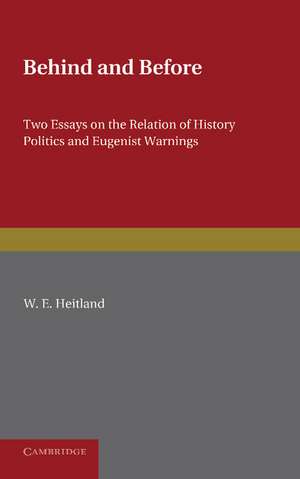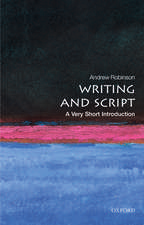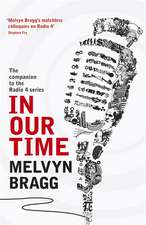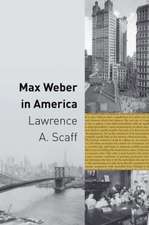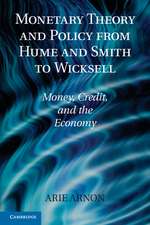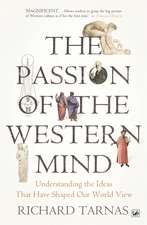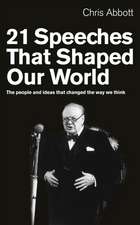Behind and Before: Two Essays on the Relation of History Politics and Eugenist Warnings
Autor W. E. Heitlanden Limba Engleză Paperback – 30 oct 2013
Preț: 260.95 lei
Nou
Puncte Express: 391
Preț estimativ în valută:
49.94€ • 51.82$ • 41.74£
49.94€ • 51.82$ • 41.74£
Carte tipărită la comandă
Livrare economică 15-29 martie
Preluare comenzi: 021 569.72.76
Specificații
ISBN-13: 9781107625587
ISBN-10: 1107625580
Pagini: 184
Dimensiuni: 127 x 203 x 11 mm
Greutate: 0.2 kg
Editura: Cambridge University Press
Colecția Cambridge University Press
Locul publicării:New York, United States
ISBN-10: 1107625580
Pagini: 184
Dimensiuni: 127 x 203 x 11 mm
Greutate: 0.2 kg
Editura: Cambridge University Press
Colecția Cambridge University Press
Locul publicării:New York, United States
Cuprins
1. Students note defects in policy; 2. Relation of policy to study. Theories. History - what use?; 3. Study in general - aims - science and art; 4. Application to history and politics. No exact science, but art in function; 5. Political art functioning in time; 6. Personalities and motive. Accidents; 7. Moral judgment and circumstance; 8. Analogies and parallels; 9. Anticipation and protraction; 10. Modern history more useful than ancient or medieval; 11. Enlarged outlook since 15th century. Political problem of Europe; 12. Representation - nationality; 13. Danger of modern analogies etc. Precedent. Irish policy; 14. Lack of checks in British constitution; 15. Need of education. Grades of education, difficulties of each; 16. The possible and desirable in historical study; 17. Orientation, its function; 18. Desultory reading, conditions of its usefulness; 19. Academic teaching. Its methods, aims and dangers; 20. Interest in subject matter discussed; 21. Foreign policy. Questions raised by nationality; 22. The value of knowledge in dealing with such issues; 23. Reaction on home conditions nowadays; 24. Dangers of error in comparing situations; 25. Student's task difficult. Questions of moral judgment; 26. Case of 17th century movements and issues; 27. Lessons derivable therefrom; 28. Analysis of questions raised in historical study; 29. Nature and conditions of experiment in politics; 30. Change of conditions owing to 'popular' government; 31. Public opinion, how to be ascertained?; 32. Swift communications, their effect. The press; 33. 'Mandates' and their inevitable difficulties; 34. Modern devices - referendum. Proportional representation; 35. Value of vox populi. Complications of mandate doctrine; 36. Has government by majority ever been an effective fact?; 37. Difficulty of gauging significance of elections; 38. History, how far indirectly of use to statesmen in facing problems arising therefrom; 39. Supreme importance of leadership; 40. Education of leaders, how best achieved; 41. Mankind and other animals as needing leaders; 42. Human nature at present beyond exact analysis; 43. Human defects recognized. Special difficulty in politics; 44. Party system. Apprenticeships. Learning by experience. 45. Practical politics and natural sciences; 46. Biological view - zoological - heredity; 47. Classes and functions. Middle class failing; 48. Heterogeneity. Danger of promoting rise into upper classes; 49. Fallacy of inequality. Are modern states experimenting rashly?; 50. Class-distinction criticized; 51. Demagogy - queries - slum-system the real present evil; 52. Laissez-faire. Socialist movements. Anti-slum movements; 53. Garden schemes good - small as yet. Despite difficulties, better than legislative palliatives; 54. True aim to improve character; 55. Training of citizens. The birth-rate question. Biological attitude as to restriction. How get the power needed for dealing with the matter?; 56. Supposed analogy of bodily and social organisms. Control of breeding - can it be applied in human societies?; 57. Is it applicable to classes as well as to individuals?; 58. Interchange between classes - query, unavoidable? Present attempts to deal with problem; 59. Rising and sinking. Query as to effects on classes; 60. Interbreeding and illegitimacy. Caution needed; 61. Biological pessimism - democracy condemned; 62. Doubts as to necessity of pessimistic view; 63. The element of time. Is it too late to reform? The boom of the 19th century and present peril; 64. Emigration as a proposed remedy, and the grave difficulties to be faced at home and in the colonies; 65. Present conditions within the British Empire. Mutual accommodation the only way hopeful; 66. Psychology and history; 67. Need of emotional influences for effective operation in public affairs; 68. Religion as supplying such influence; 69. Conclusions; Remarks on the s
Descriere
Originally published in 1924, this book presents two essays containing William Emerton Heitland's thoughts on eugenics.
